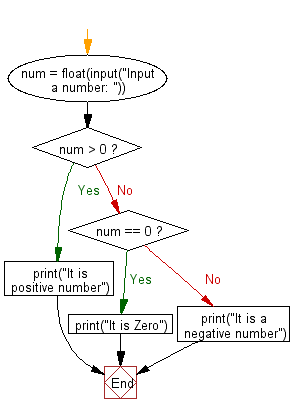Python: Check if a number is positive, negative or zero
Resolve Path Name
Write a Python program to check if a number is positive, negative or zero.
Positive Numbers: Any number above zero is known as a positive number. Positive numbers are written without any sign or a '+' sign in front of them and they are counted up from zero, i.e. 1, + 2, 3, +4 etc.
Negative Numbers: Any number below zero is known as a negative number. Negative numbers are always written with a '−' sign in front of them and they are counted down from zero, i.e. -1, -2, -3, -4 etc.
Always look at the sign in front of a number to check if it is positive or negative.
Zero, 0, is neither positive nor negative.
Pictorial Presentation:

Sample Solution-1:
Python Code:
# Prompt the user to input a number, and convert the input to a floating-point number.
num = float(input("Input a number: "))
# Check if the number is greater than zero.
if num > 0:
# If true, print that it is a positive number.
print("It is a positive number")
# Check if the number is equal to zero.
elif num == 0:
# If true, print that it is zero.
print("It is zero")
else:
# If the above conditions are not met, print that it is a negative number.
print("It is a negative number")
Sample Output:
Input a number: 150 It is positive number
Flowchart:

Sample Solution-2:
Python Code:
# Prompt the user to input a number and convert the input to a floating-point number.
n = float(input('Input a number: '))
# Use a conditional expression (ternary operator) to determine if the number is positive, zero, or negative.
# The conditional expression checks if the number is greater than 0, equal to 0, or less than 0.
# Depending on the condition met, it prints a corresponding message.
print('Number is Positive.' if n > 0 else 'It is Zero!' if n == 0 else 'Number is Negative.')
Sample Output:
Input a number: 0 It is Zero!
Sample Solution-3:
Python Code:
# Prompt the user to input a number and convert the input to a floating-point number.
n = float(input("Input a number: "))
# Check if the input number is greater than or equal to 0.
if n >= 0:
# If the number is zero, print that it is zero.
if n == 0:
print("It is Zero!")
# If the number is greater than zero, print that it is a positive number.
else:
print("Number is Positive number.")
# If the number is less than zero, print that it is a negative number.
else:
print("Number is Negative number.")
Sample Output:
Input a number: -150 Number is Negative number.
For more Practice: Solve these Related Problems:
- Write a Python program to resolve a symbolic link to its real path.
- Write a Python program to get the canonical path of a given file.
- Write a Python program to normalize a given file path.
- Write a Python program to check if a path exists before resolving it.
Go to:
Previous: Write a Python program to find path refers to a file or directory when you encounter a path name.
Next: Write a Python program to get numbers divisible by fifteen from a list using an anonymous function.
Python Code Editor:
What is the difficulty level of this exercise?
Test your Programming skills with w3resource's quiz.
